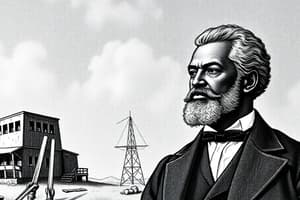Podcast
Questions and Answers
What does Douglass emphasize about the effect of slavery in Chapter 9?
What does Douglass emphasize about the effect of slavery in Chapter 9?
- It fosters community support.
- It leads to begging and stealing. (correct)
- It makes individuals stronger.
- It ensures financial stability.
In Chapter 9, how do people justify their slaveholding actions?
In Chapter 9, how do people justify their slaveholding actions?
- Due to political pressures.
- As a means of education.
- Through economic necessity.
- By citing religious passages. (correct)
What does the phrase 'he brought her, as he said, for a breeder' highlight about Covey's cruelty?
What does the phrase 'he brought her, as he said, for a breeder' highlight about Covey's cruelty?
It indicates he bought a female slave just to produce children for profit, treating her like an animal.
In Chapter 10, Douglass states that his fight with Covey marks a turning point in the narrative.
In Chapter 10, Douglass states that his fight with Covey marks a turning point in the narrative.
What importance does reputation have for Covey according to Douglass?
What importance does reputation have for Covey according to Douglass?
What does Douglass suggest about holidays and the slaveholder's intentions?
What does Douglass suggest about holidays and the slaveholder's intentions?
What does Douglass mean by '..made so by the lash of this merciless, religious wretch'?
What does Douglass mean by '..made so by the lash of this merciless, religious wretch'?
How is slavery personified in Douglass's description?
How is slavery personified in Douglass's description?
Douglass notes that any display of humanity towards a colored person was considered abolitionism.
Douglass notes that any display of humanity towards a colored person was considered abolitionism.
What does Douglass imply about keeping slaves ignorant?
What does Douglass imply about keeping slaves ignorant?
Flashcards are hidden until you start studying
Study Notes
Chapter 9 Highlights
- Slavery dehumanizes individuals, leading them to beg and steal for survival.
- Slaveholders often justified their inhumane actions with religious doctrine, reflecting deep moral contradictions.
Chapter 10 Highlights
- Covey's cruelty is exemplified by his purchase of a female slave solely for the purpose of breeding, treating her as property rather than a human being.
- Douglass' confrontation with Covey signifies a pivotal moment in his life, illustrating the transformation from slave to empowered individual.
- Reputation is crucial for Covey, influencing his decisions to avoid punishment even when he is aware of his cruelties.
- Slaveholders offer holidays to create a facade of freedom while preventing actual rebellion, manipulating the desires of enslaved individuals.
- Douglass critiques the hypocrisy of slaveholders, who profess religious beliefs while inflicting terrible violence.
- Slavery is characterized as a monstrous entity, depicted with vivid imagery of blood and brutality.
- The societal fear of being labeled an abolitionist stifles compassion, discouraging any support for the oppressed.
- Ignorance among slaves is cultivated deliberately by slaveholders to maintain control and suppress potential uprisings.
Studying That Suits You
Use AI to generate personalized quizzes and flashcards to suit your learning preferences.




